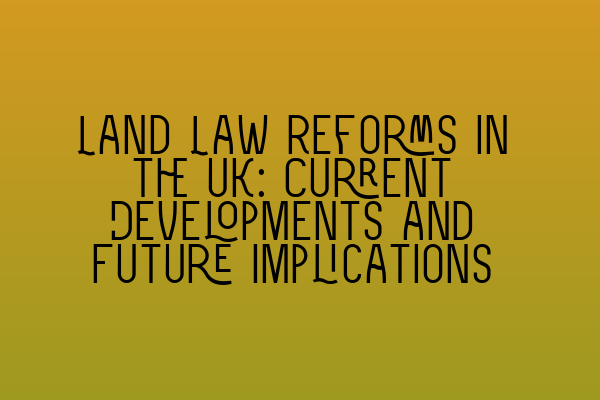**Land Law Reforms in the UK: Current Developments and Future Implications**
As the UK continues to evolve and adapt to the ever-changing dynamics of property ownership and land management, it is essential for solicitors and legal professionals to stay up-to-date with the latest land law reforms. These reforms not only impact the regulatory landscape but also have far-reaching implications for property transactions and disputes. In this blog post, we will explore some of the current developments in land law and discuss their potential future implications.
**1. Land Registration Reforms**
One of the significant land law reforms in the UK is the ongoing modernization of the land registration system. The Land Registration Act 2002 introduced a simplified and more efficient system for registering land and property ownership. However, further reforms are underway to enhance the system’s accessibility and accuracy.
The Digital Transformation of Land Registration Programme aims to digitize the entire process, making it easier for individuals and professionals to access and update land registration information. This will significantly reduce the time and effort required for property transactions and reduce the risk of fraudulent activities.
With these reforms, solicitors and conveyancers must stay informed about the changes in the land registration process and ensure compliance with the new requirements. It is essential to keep an eye on the progress of these reforms, as they will shape the future landscape of property law practice.
**2. Leasehold Reforms**
Leasehold reforms have been a hot topic in recent years, as concerns about unfair practices and exorbitant fees have come to light. The government has taken steps to address these issues and protect leaseholders’ interests.
The Leasehold Reform (Ground Rent) Bill seeks to restrict ground rents on new residential leases to a peppercorn (nominal) amount. This will prevent leaseholders from being subjected to aggressive ground rent increases and ensure more equitable and transparent leasehold agreements.
Additionally, the proposed ban on the sale of new leasehold houses aims to provide greater security and protection for homeowners. This reform would make homeownership more straightforward and reduce the potential for abusive leasehold practices.
Solicitors specializing in property law need to stay up-to-date with these leasehold reforms to ensure they can provide accurate advice and guidance to clients. Understanding the implications of these changes will be crucial when dealing with leasehold transactions and disputes in the future.
**3. Environmental and Climate Change Considerations**
As the global focus on environmental protection and sustainable development intensifies, the UK land law sector is also experiencing significant changes. Environmental considerations and climate change issues play an increasingly prominent role in land management and property transactions.
Regulatory frameworks such as the Environmental Impact Assessment (EIA) Regulations and the Energy Performance Certificates (EPC) regime require solicitors to assess and advise on the environmental implications of land use and development projects. This includes identifying potential risks and mitigating factors related to biodiversity, pollution, and carbon emissions.
Furthermore, the drive towards a more sustainable and low-carbon future has led to the emergence of green leases. These leases include provisions that encourage environmental responsibility, such as energy-efficient building requirements and waste management practices.
To effectively navigate this evolving landscape, solicitors need to have a sound understanding of environmental legislation and be able to provide comprehensive advice on how these considerations may impact property transactions.
**Conclusion**
Land law reforms in the UK are continuously shaping the legal and regulatory framework for property transactions and land management. Solicitors and legal professionals specializing in property law must stay informed about these developments to provide effective and compliant advice to their clients.
The land registration reforms, leasehold reforms, and environmental considerations discussed in this blog post highlight some of the current developments and future implications in the field. By staying up-to-date with these reforms, solicitors can ensure they are well-prepared to navigate the complexities of land law and offer excellent service to their clients.
To further enhance your understanding of property law and prepare for the Solicitors Qualifying Examination (SQE) in the UK, check out our related articles:
[SQE 1 Practice Exam Questions](https://fqps.co.uk/sqe/sqe1-preparation/mcq-practice-quiz)
[SQE 1 Practice Mocks FLK1 FLK2](https://fqps.co.uk/sqe/sqe1-preparation/practice-mocks-quiz)
[SQE 2 Preparation Courses](https://fqps.co.uk/sqe/sqe2-preparation)
[SQE 1 Preparation Courses](https://fqps.co.uk/sqe/sqe1-preparation)
[SRA SQE Exam Dates](https://fqps.co.uk/sqe/sqe1-sqe2-exam-dates)
Keep abreast of the latest developments in land law, adapt your practice to the changing landscape, and ensure your clients receive expert advice and representation. The future of land law is dynamic and exciting, and by staying informed, you can be at the forefront of innovation in the field.
Disclaimer: This blog post does not constitute legal advice and is for informational purposes only. Always consult a qualified solicitor for specific legal advice related to your circumstances.
